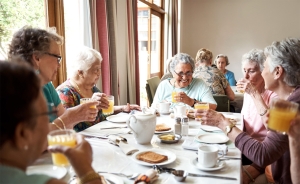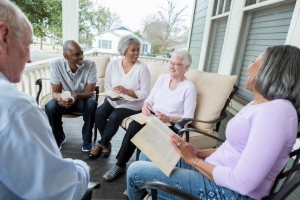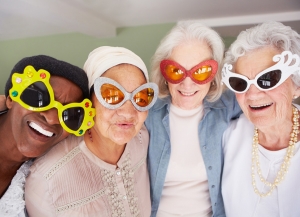National Book Month is the perfect time for older adults to gather together with a group of like-minded bookworms to celebrate your love of a good story. Every October, National Book Month coincides with the announcement of the National Book Awards, bringing attention to the importance of literature and literacy, encouraging people of all ages to immerse themselves in the joy of reading, writing, and sharing stories. We’ve put together tips to help older adult “book lovers” start a book group and infuse fun and fancy into your group meetings.
Basic Guidelines for Older Adult Book Groups
Before we jump into book club ideas, we want to remind you of a few basic guidelines to help ensure your group is successful and fun for all:
Size, Structure and Consistency. A good book group size is 4-8 people, especially if you’re group is just forming. Stick to a routine meeting time. For example, meeting monthly, the third Tuesday at 6:30 – 8:00pm, at a standard meeting place or rotating to meet at a member’s home. You’ll also want to have structure to agree upon:
- How will books be chosen?
- Who will lead the meetings?
- Who will be responsible for overall group communication?
Purpose, Goals & Ground Rules. Will your book club focus on a specific genre: fiction (which we focus on in this article), nonfiction, thriller, historical fiction, true crime, or some other genre? Or maybe yours is an eclectic group with all members willing to read “outside their comfort zone.” Assess what members want to get out of the group: friendship, expanding their reading horizons, learning something new? Also set ground rules for acceptable participant conduct (mutual respect, being non-judgmental, having an open mind, being on time, etc.)
Communication Plan. Phone tree, email, text message—have a way to communicate with all group members about the selected book title, who is leading/hosting the next meeting, and any changes to an upcoming meeting, etc. Also, be sure to use an RSVP system so that the host can prepare accordingly for number of participants.
Prepare Thoughtful Discussion Questions. Some, but not all, books come with discussion guides. If you aren’t sure how to prepare thoughtful discussion questions for your older adult book group, seek the help of a librarian (also a great resource for choosing books that older adults will love to discuss).
Encourage Participation, Support Differing Views. Everyone has to agree (back to purpose and goals) to be respectful, open-minded, and supportive even if views of a book or responses to discussion questions are not “on the same page.” Have an agreed upon plan for how differing points of view will be navigated in order to keep discussion lively and insightful for all. Remember, reading has many benefits for mental and emotional well-being; book group should add to, not detract from, those benefits.
4 Fun Ideas for Older Adult Book Clubs
National Book Award Fall Reading Group
The longlist for the National Book Award Finalists in Fiction was announced in September 2025. In October, that list will be shortened (aka “the shortlist) in advance of the award recipient being announced in November. This makes October a great month to gather your fellow bookworms together to read one of the semi-finalist novels.
A Haunted Theme for Your Book Club
‘Tis the season for spooky things so why not focus your book group on a haunted tale or two? Consider a collection of classic short stories (Hawthorne or Poe, perhaps?) For something more contemporary—you’ll get a good scare from the English writer, Ramsey Campbell, an older adult author known for known for his quiet, psychological stories of dread and unease.
Favorite Character Book Club Meeting
Each month your book club picks a novel to read and discuss. Well, now your members can get into character for the book discussion! When the group meets to discuss the chosen title, each member must come in some form of costume (or at least bring a few token accessories) that symbolize one of the characters. The person who selected the book and is leading the discussion gets to pick first the character they’d like to be. All other members pick a character by either drawing character names from a jar or some other random assignment you all agree on. It’s also fun to serve snacks that are aligned with the genre, theme, or premise for the book.
Book and Beverage Pairing Event
In fine dining establishments, appetizers to entrées have an appropriate pairing with a specific beverage, from an aperitif to a demitasse to a full-bodied wine or fermented drink. Now, what beverage might be the best pairing for your favorite book? That is what you and your book club members will find out at this pairing event! Each member will bring a copy of their favorite book (along with an enticing summary) and a beverage to pair with it, along with a rationale for why the two go together. If there’s concern about whether or not caffeine or alcohol is appropriate for all members, then set ground rules for that; there are plenty of “virgin options” for wine and spirits.
Spice-up Your Book Group’s Gathering Space
Finally, consider the following tips for elevating the aesthetics of the gathering to create a delightful atmosphere for discussion:
- ambient lighting, electric candles, or fairy lights
- throw pillows, cozy blankets, and fuzzy socks on chilly night
- play soft music in the background such Mozart, Vivaldi or Bach to support focus, concentration, and creativity (ask members to take turns selecting music)
- decorate your meeting space to align with a book’s theme, time period, or setting
- serve drinks and treats to keep everyone alert and engaged
A Golden Experience for Older Adults at Everbrook Senior Living
At Everbrook Senior Living, our residents participate in a wide variety of stimulating activities that promote social connection, creativity, and intellectual curiosity. We invite you to visit one of our award-winning, best-in-class luxury residences, located throughout New England. Our compassionate, professional staff are committed to making every resident’s experience “golden”. Learn more.













